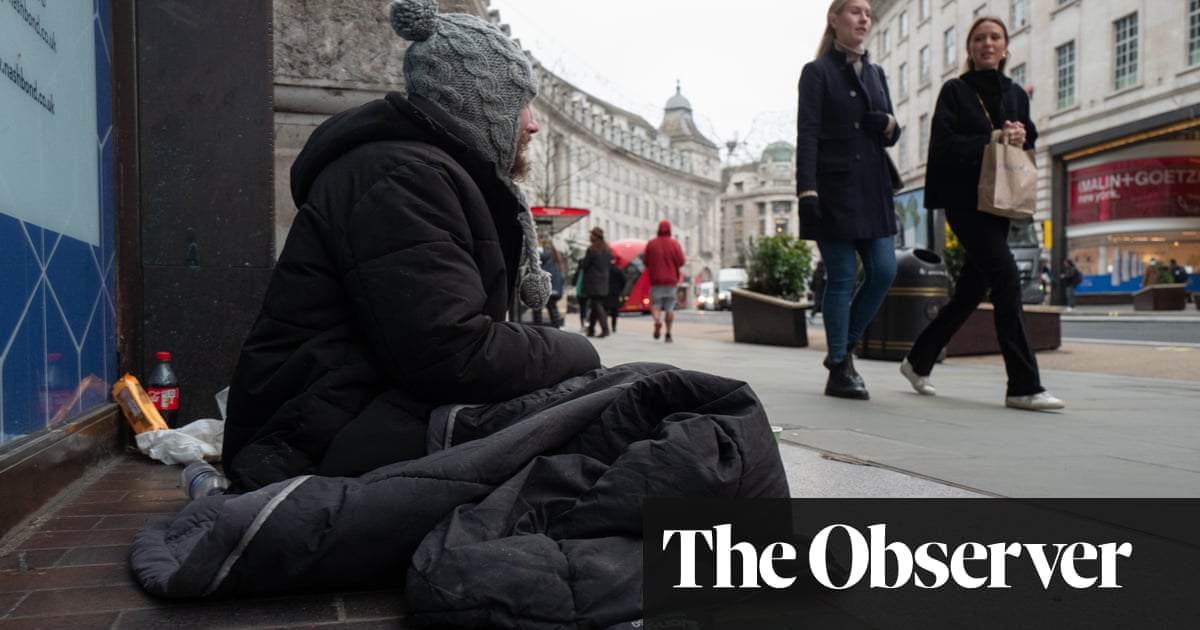- cross-posted to:
- [email protected]
- [email protected]
- cross-posted to:
- [email protected]
- [email protected]
The new study, funded by the government and carried out by King’s College London (KCL) and the homelessness charity Greater Change, will recruit 360 people in England and Wales. Half will continue to get help from frontline charities. The other half will get additional help from Greater Change, whose support workers will discuss their financial problems then pay for items such as rent deposits, outstanding debts, work equipment, white goods, furniture or new clothes. They do not make direct transfers to avoid benefits being stopped due to a cash influx.
Professor Michael Sanders, who runs KCL’s experimental government unit, said: “What we’re trying to understand is the boundary conditions for cash transfers. When does it work? For whom does it work? What are the amounts you need to give people in order to make it work?”
One of the first cash transfer schemes was in Mexico in 1997 and since then they have been used around the world. But most evidence is from low and middle-income countries, and there has been opposition from politicians and the public, who often believe people will spend the money unwisely. Last year researchers in Canada found that giving CA$7,500 (£4,285) to 50 homeless people in Vancouver was more effective than spending money housing them in shelters, and saved around CA$777 (£443) per person.
there has been opposition from politicians and the public, who often believe people will spend the money unwisely
Aye, there’s the rub: people disregarding evidence in favor of their beliefs unsupported by reality.
I don’t think it’s unfounded, but it depends on the situation of the person. If they are there through addiction any money will feed the addiction first. If the person doesn’t have that issue, then money can be the first step on the road back into society.
Also, key point in the article. The scheme doesn’t give them cash. It pays for things on their behalf. They say it’s to avoid benefits being stopped, and I’m sure that’s true but I expect it’s also so they can control what it’s being spent on.
Money and shelter is always the first step.
Kicking an addiction is hard. Kicking an addiction without your basic needs met, is even harder.
People like to think that the homeless should solve the reasons for their homelessness first, and only then be helped. Because otherwise the help will just go to waste.
In reality, it should happen the other way around. The help makes it more likely they’ll solve their problems at all, and hence actually leads to less homelessness overrall.
Agree with what everything you wrote, except somebody with an addiction doesn’t act rationally. If an addict has an opportunity to do something constructive with money, or can satisfy the addiction just one more time… The addiction wins.
This is why addiction is so awful. It becomes the most important thing, and you will destroy anything else in your life to satisfy it. Then when everything is gone it still holds you down.
I agree the order of things needs to be basic needs first, but an addict is unlikely to make that choice and needs help doing it. Not just the money to do it.
Obviusly.
But you can’t ask an addict to start resisting their addiction, if the have nothing else.
They need something to resist it for. If they don’t have that, their next high IS the most important thing to them.
And this whole thing where we keep saying “the addiction will win every time” promotes a defeatist attidue towards helping these people that has lead to policies that are literally killing them.
The addiction doesn’t win every time. If that were true there wouldn’t be any saving any addict ever.
Addicts can and will turn anything and everything of value given to them into money, that can then buy them another high, but that CANNOT be used as an excuse to refuse to help them.
Institutionlize, maybe, but that’s a healthcare problem, not a homeless problem. And that kind of help should be available to a person before they are ever put out of a home.
I think you missed the point of the person you responded to. The point wasn’t to not help them, but to provide those basic needs and help them recover before starting to give them money as well. Give them housing, food, clothing, and access to resources to get better. Then, once they are in a better place to take care of themselves, give them the money to support themselves.
They edited their response. When I responded there was only one paragraph and the stuff about the support not just being money wasn’t even aknowledged in their comment.
It pretty much always helps in the long run, though, and the argument is that a couple people might misuse the funds and so we shouldn’t run the program then I have some blunt force trauma I’d love to send your way(I hope that wasn’t your argument but since it doesn’t really add to the conversation in any other way I’m not sure what you were getting at).
Besides, look at Rat Park to see why people even turn to drugs so often anyway. They’re bored and left without the resources to live fulfilling lives and they turn to the substances that take away their pain. Just pay them, and keep the shitty puritan morality out of it. They’re in a place that’s pretty much as low as one can get, I’m gunna give ‘em some breathing room to make mistakes.
And if we’re so worried about people misusing government-given funds then I’ve got a long list of rich “proper” folk who’d I’d happily string up by their toenails and leave to hang in the hot sun if we’re trying to get all horny for punishment.
Yeah I mean a couple people are gonna end up spending their money poorly. Probably use it for vanity projects like building rocket ships with their names on it and carving out mountains for “art” projects.
See how the wealthy treat the planet it’s obvious that no one deserves it. Maybe we can ask people for what purpose they want to be alive first and give them just enough life to do that so they don’t get greedy.
Most studies show that between 2-5% of any demographic misuses/abuses a system. Those are pretty low numbers in the big scheme of things.
The problem is when we look at the flip side … 95-98% of people follow a system’s rules, yet almost every system we have chooses to police everyone like they’re part of the 2-5% … unless they’re rich. Then the rules change to their benefit (like a recent example in Canada’s Revenue Service for instance … https://www.cbc.ca/news/canada/canada-revenue-agency-bogus-tax-refunds-1.7366935)).
This has been tried multiple times across numerous jurisdictions. Consistently it’s been found that giving poor people money makes them less poor in the long run. This seems to be an unsavory result, however, so politicians let the experiment retire never to actually learn from the results and draft policy.
This experiment is going to work and then nothing will come of it only for another jurisdiction to try exactly the same thing again and find exactly the same results.
The myth of meritocracy is still too prevalent a belief.
George Carlin hit this on the head. If you don’t have the homeless there’s no one to scare the poor into working.
For the wealthy, It’s important to keep people one paycheck away from the street. If you pay people too much, they have options. When people have options, they don’t blindly obey. If people know they can’t ever hit the street, they will demand more from the rich to wipe their asses.
This is why slavery exists. As long as you put food in the trough, they are alive to serve.
who often believe people will spend the money unwisely
But if they spend that money “unwisely,” it’s fine. Sure, you can buy a $50 bottle of wine to get drunk with friends at dinner, but they get drunk on some cheap malt liquor because they’re fucking homeless and it sucks- or, heaven forbid, get addicted to opiates because they’re in pain and live in a country with a for-profit health care system- and they’re the problem.
Giving them cash is nice. Giving them homes would be nicer. If you house the homeless and also offer them addiction counseling and mental health care, most of them don’t end up back on the streets. Sure, some people will always be homeless, but most homeless people just need help to get out of that situation.
But money helps too. You can’t afford a phone or new clothes that don’t stink and look presentable? Or just basic toiletries? Good luck getting a job.
Also shelters don’t count and you cannot interpret refusal to stay at a shelter as “wanting to be homeless.”
I help out with a street outreach mutual aid group. I’ve not met a single person that wanted to be homeless but I’ve met tons of people that don’t want to fuck with shelters cause:
- they have to get rid of their dog
- they can’t bunk with their partner or children
- they are trans and most of the shelters are religiously affiliated
- there are tight curfews and early kick out times
- no guarantee of consecutive night stays or even a bed, no consistency
- you can’t have friends over
- you can’t have more than one bag
- you must walk outside to a separate communal bathroom–even in a blizzard–if a pee cup is discovered you’ll be kicked out
- you must attend religious services prior to receiving aid
- some shelters are day only
The streets are harsh, but in most cases the shelters are worse. Their only consistent benefit is that they are warm when it’s -20F out and if you keep your head down the police will probably not fuck with you.
Agreed 100% and the dog part is even more serious than people think because a lot of homeless women need their dog for protection. So their choice is then either temporary shelter and no protection once they’re back out on the streets or protection but no shelter.
Who knew that poverty, a condition created by lack of money, could be solved by simply giving people money?
Next up you’ll tell me they’ll give hungry people food.
Hungry people will only waste the food by eating it /s
(Almost) all poverty in western nations today is artificial; That means, poverty is intentionally created to keep people on their toes, because it is believed that makes them go to work. The economy needs workforce, after all.
When there’s a smaller demand for workers, I believe UBI support will go up. That is why I support AI.







